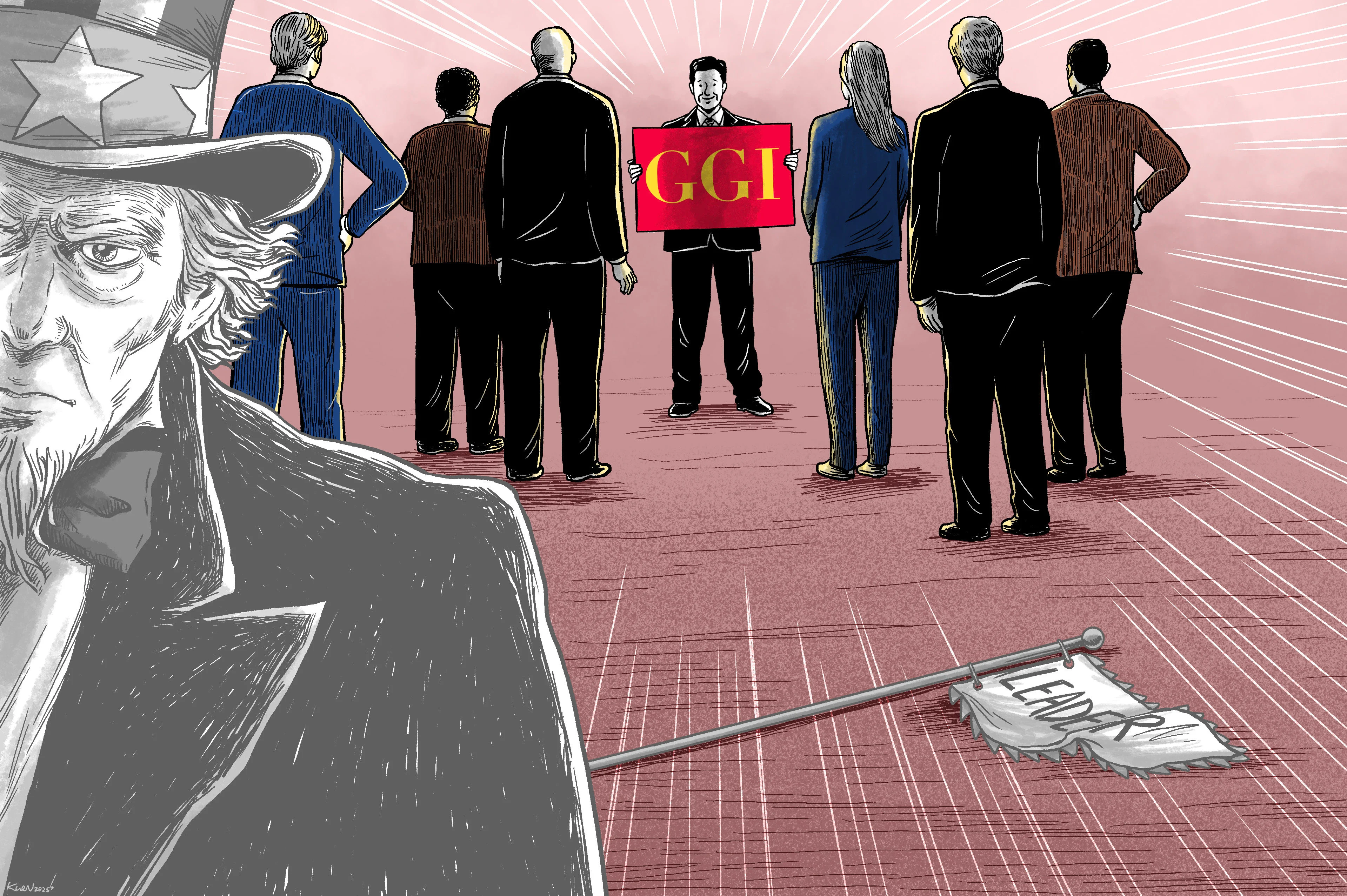By Shi Jiangtao
Copyright scmp

As Washington continues to retreat from its traditional leadership role in the post-war international order, particularly under the “America first” doctrine, Beijing has stepped in with a calculated response to the widening vacuum in global governance, unveiling what observers call a “master plan” for reform.
China’s newly unveiled Global Governance Initiative (GGI), launched this month to commemorate the 80th anniversary of the United Nations, represents its most comprehensive and structured effort to articulate a vision for reshaping the international system, according to experts.
In a carefully orchestrated move, the initiative was formally introduced by Chinese President Xi Jinping at the Shanghai Cooperation Organisation (SCO) summit in Tianjin on September 1, shortly before a high-profile military parade marking 80 years since Japan’s formal surrender in World War II.
While the five-point initiative builds on China’s long-standing multilateral rhetoric, its formal launch amid global instability – wars in Ukraine and Gaza, economic fragmentation, and waning trust in US leadership – appears designed to appeal to disillusioned nations, especially in the Global South.
Beijing’s emphasis on inclusive multilateralism, sovereign equality, and developmental autonomy free from ideological conditions stands in stark contrast to US President Donald Trump’s transactional diplomacy, unilateral tariff measures, and selective engagement, highlighting the divergent approaches the two superpowers take towards global leadership and cooperation.
Introduced amid growing doubts about the credibility of US-led multilateralism, observers said the initiative reflected China’s ambition to shape a multipolar world in which developing countries gain greater representation and rule-making power in global decision-making.
The timing of the launch, coupled with its setting at a platform dominated by China, Russia, and other non-Western states, many of which face US sanctions or diplomatic pressure, enabled Beijing to position itself as both a counterweight and a stabilising force within an increasingly fragmented and multipolar system.
Observers agreed that the GGI marks a more ambitious phase in China’s global engagement, accelerating its push to propose alternative models of governance since Trump’s disengagement from international institutions and growing scepticism towards multilateral frameworks.
Neil Thomas, a politics fellow at the Asia Society Policy Institute’s Centre for China Analysis, said the initiative was Beijing’s pitch for an international order that emphasises economic exchanges over democracy, human rights, and security alliances.
“The Global Governance Initiative is a strategic repackaging of existing policies that seek to increase China’s international influence at the expense of the United States and other Western countries,” he said.
“For many developing countries, this represents an attractive proposition; for the West it would be the end of its leadership in global governance.”
Historically a cautious player in global affairs, China long maintained limited international engagement, adhering to principles of non-interference and ideological alignment.
That posture began to shift with the launch of reform and opening-up, and more decisively with China’s accession to the World Trade Organization in 2001, signalling a growing willingness to integrate into multilateral institutions.
Combined with the perceived decline of American unipolar dominance after the 2008 global financial crisis, these milestones spurred China’s evolution from a passive rule-follower to a proactive agenda-setter, challenging Western dominance and structural biases embedded in the post-war order.
The GGI seeks to address persistent governance deficits, including the underrepresentation of the Global South, the erosion of UN authority, and ineffective responses by existing institutions to transnational challenges such as climate change, digital regulation, and economic inequality.
Addressing the Brics virtual summit on September 8, Xi implicitly critiqued the perceived inequities of the US-led trade and security architecture, claiming his initiative was aimed at “galvanising joint global action for a more just and equitable global governance system”.
Deng Yuwen, former deputy editor of Study Times, the official publication of the Central Party School of the Communist Party, said the initiative reflected China’s call for reforms aimed at strengthening rather than replacing the existing UN-based international system.
Drawing from earlier efforts such as the Global Development Initiative, the Global Security Initiative and the Global Civilisation Initiative launched between 2021 and 2023, the GGI consolidates these frameworks into a more cohesive vision presented under one umbrella, according to Deng.
“Taken together, especially with the introduction of the GGI, these four initiatives not only reflect China’s vision for the future world order but also articulate its policy direction. I believe they form a comprehensive framework for Xi Jinping’s diplomatic thinking,” Deng said.
“While the previous three initiatives each focus on specific domains, the GGI serves as an overarching framework – what Chinese might call the ‘master plan’ – as it particularly touches on sovereignty and China’s vision for future international relations.”
According to a concept paper released by China’s foreign ministry on September 1, the GGI emphasises the principles of sovereignty, equality, non-interference, multilateral decision-making, and “win-win” cooperation, prioritising stability and development over liberal democratic norms.
China advocates sovereign equality, calling for equal participation in global governance and respect for each country’s right to choose its development path. It promotes adherence to international rule of law through the UN Charter, while opposing selective enforcement and double standards.
Multilateralism is framed as inclusive and consensus-driven, rejecting exclusive blocs and unilateralism. Beijing also calls for a people-centred approach, underlining the need to reduce inequality and address shared challenges such as climate change and digital divides.
Finally, the initiative calls for action-oriented reform, focusing on practical outcomes in areas with governance gaps, including finance, trade, artificial intelligence, and outer space.
Sourabh Gupta, a senior policy specialist at the Institute for China-America Studies in Washington, said the new initiative “closes a gap regarding the governance dimension that the previous initiatives never did quite zero in on”.
According to Gupta, the most important takeaway from the GGI is that, at a time when the United States has shown reluctance to fulfil its global responsibilities, China has pledged to “reinvigorate the UN’s authority and effectiveness with a majority of similarly minded states that are invested in buttressing the UN’s centrality.”
“The system, after all, is the one that propelled its own meteoric rise over the past four decades and counting,” he said.
“The message that China does not have the will or the inclination to recreate the international system anew – let alone, wish to tear it down, is one that will be received reassuringly. And doubly so at a time when the US’ strength and desire to underwrite the post-1945 order is gradually ebbing away, and queries have been raised as to what sort of alternative order China wishes to institute.”
Gupta added that the GGI showed China’s view of Trump’s tariff chaos – following his predecessor Joe Biden’s limited outreach to the Global South – as “an opportunity, and it is playing offence”.
“The GGI is timed to capitalise on the disruption heaped on the global order and to multilateral rules by Trump’s ‘America first’ policies,” he said. “And the GGI’s purpose is to convey a forward-looking view that China, by contrast, is a responsible stakeholder that will actively shoulder an increasingly greater burden of global public goods.”
Deng also noted that China’s global governance model, marked by a deliberate softening of ideological rhetoric, offers a pragmatic and less intrusive alternative to US strategies, particularly in light of America’s domestic political polarisation and increasingly inward-looking posture.
“While Trump’s transactional approach emphasised unilateralism, and Biden’s values-based diplomacy tied cooperation to democratic reforms and rule-of-law standards, China’s GGI deliberately avoids ideological imposition,” he said. “It appeals to those wary of external interference, conditional aid, or interventionist policies.”
The GGI’s emphasis on sovereignty and multilateralism, especially through platforms such as the SCO and Brics, reflects China’s effort to promote “consultation among all” as an alternative to Washington’s more assertive leadership style, according to Deng.
He described the initiative’s launch, timed just ahead of a military parade attended by Russian President Vladimir Putin and North Korean leader Kim Jong-un, as a case of integrated diplomatic and military signalling.
“A leadership vision needs to be paired with demonstrations of power,” he said. “Clearly, China intends to play a leading role in multilateral fora. If future global governance is to have two centres of gravity, one would be the United States, and the other would be China.”
Although the initiative is intended for the entire world, Deng added, “it is foreseeable, however, that Western countries are unlikely to respond enthusiastically; genuine resonance is more likely to come from the Global South”.
Carola Ramon-Berjano, an economist, former diplomat and executive committee member at the Argentine Council of Foreign Relations (CARI), said China’s emergence as an economic superpower had given rise to an alternative form of multilateralism.
“Alongside China’s economic rise, we have witnessed a reshaping of its global role, becoming more assertive and more engaged in multilateral affairs. This is what I referred to as a new type of globalisation, a globalisation ‘with Chinese characteristics’,” she said.
“At a time when many countries are retreating from globalisation, China has been very vocal in its support for market liberalisation and free trade, with cooperation and multilateralism at the heart of its discourse.”
“China has thus become a provider of an alternative interpretation of cooperation, multilateralism, and development. Rather than conflicting with existing multilateral institutions, this alternative complements them,” she said.
Ramon-Berjano, who previously served as undersecretary for multilateral and bilateral economic negotiations at Argentina’s foreign ministry, said that China’s initiatives, including the GGI, did not represent a confrontational strategy or an attempt to redefine the global order, but “rather a natural expansion of China’s growth and evolving role in the world”.
“On one hand, China has not broken with traditional Western institutions,” she said, citing its active participation in the WTO, United Nations, and Paris Agreement.
“On the other hand, China – still identifying as a developing country – is proposing an alternative and complementary world order, with new institutions and strategies that define a new globalisation: one led from the South, with ‘Chinese characteristics’.”
However, Rana Mitter, a professor and S.T. Lee Chair in US-Asia relations at the Harvard Kennedy School, said the GGI was “more about suggesting a difference with a US which is sceptical of the UN-based order than a detailed blueprint”.
“The GGI is still very broad in its language but doesn’t yet have much specific about it,” he said.
He noted that while the initiative “does stress economic development, which is a nod to the Global South, which is still largely concerned with finding sources of sustainable growth”, it fell short of clearly defining what it meant by “governance”.
Mitter emphasised that “there is no real sense of a China-led global order”, noting that many countries in the Global South preferred diversified trade partnerships rather than alignment under a single hegemon.
Pointing to regional complexities, he added that China had a “particular issue in Asia”, where many other powers – including Japan, India, and the Association of Southeast Asian Nations – were wary of potential Chinese military action.
“The proposal is most likely to appeal to Global South actors if it brings significant financial benefits,” he said. “However, China’s new development plans offer less subsidies than in the past to other countries, so Beijing will have to work harder to sell an economically attractive message to the newly emerging global actors.”
Jordi Quero Arias, adjunct professor of international relations at the Institut Barcelona d’Estudis Internacionals (IBEI), said that while China had signalled its intent to act as a major power, many questions remained unanswered.
He said many aspects of the GGI fell into the “‘too-early-to-tell category”.
“We only have a label, and the substance still needs to be defined. We’ll have to wait and see how China attempts to translate this into concrete action,” he added.
Despite growing speculation about China’s intentions, including the possibility of redefining the global order, Xi’s remarks and the accompanying concept paper seem to be “a reaffirmation of established norms and institutions” and of “all foundational principles of the post-1945 world order”, he said.
Quero Arias, also a researcher at the Barcelona Centre for International Affairs (CIDOB), said China’s alignment with Russia and North Korea raised uncomfortable questions about its diplomatic coherence.
“China does not clearly articulate what it sees as the current problem. From its perspective, who is challenging the international order, and how?” he said. “Would all participants genuinely support the institutions China claims to promote? Is Russia, for instance, truly aligned with principles like sovereign equality, international rule of law, or multilateralism?”
He concluded that “it seems Beijing is focusing primarily on the shortcomings of Trump’s foreign policy – its naivety and missteps – while overlooking the broader global behaviour of other states that also undermine these norms and principles.”
Despite Beijing’s ambition and the initiative’s symbolic momentum, the long-term sustainability of the GGI remains uncertain – constrained by China’s economic headwinds, domestic challenges, and internal divisions within multilateral platforms such as the SCO, Brics, and the broader Global South.
“China’s economic future is critical to its international power,” said Thomas of the Asia Society. “If China keeps catching up with the United States, the GGI will become a more powerful vision for the international order. If China goes the way of Japan, then the GGI could fall by the wayside.”
But Gupta said that despite the constraints, China was “well-poised to play an active and potentially transformative role in global economic – not political – governance over the next two decades”.
From global public health and climate change to monetary systems, trade frameworks and technological transformation, “Beijing could, should, and will become a peer provider of global public goods alongside the developed West,” he said.
While the West tends to view China’s global vision through a security lens and sees it as polarising, Gupta cautioned against allowing Western powers to monopolise the narrative.
“One cannot remain hostage to the West’s determination to foist its own ‘discourse supremacy’, including on the ordering of the global system, on others,” he said.
“The intent of the GGI is to forge common ground, not invite geopolitical and ideological polarisation – although I will admit that it is timed to exploit the West’s governance failures.”
The real challenge for China, Gupta said, was to craft “detailed, forward-looking policy measures” across these functional areas and “communicate them intelligently to audiences at home and abroad.”
“In my view, the GGI is more than just strategic packaging. And the initiative could have great promise, given the dearth on the global governance front. But if not explicated further with substantive content, the GGI will remain just an empty shell like the GSI and the GCI,” he said.
“Repeated articulations only of broad principles from 36,000 feet – the typical playbook of the Chinese leadership – will not cut it.”



